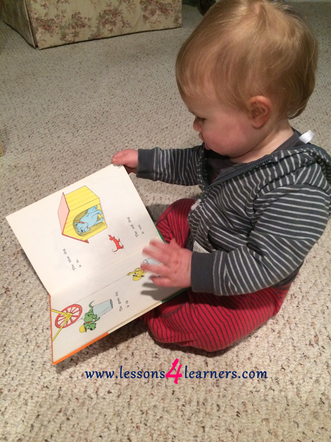Ice Cream Sensory Book
Lesson Plan:
|
Activity:
Ice Cream Sensory Book Lesson plan developed by Ms. Erika Geelhoed, BA Ed Age Group: Young Infants * Lesson plan objective and assessment can be adapted to use this activity with mobile infants, toddlers or preschoolers. Objectives: Children will:
|
|
CDA Competency Standard:
II.6.1b
Materials:
|
Procedure:
- Prepare for activity by creating the ice cream sensory book.
- Use various textured materials and glue to create different ice creams.
- Allow to dry and hole punch the pages.
- Put them in the desired order on the binder rings.
- Show the children how to turn the pages of the book.
- Talk with them about the different textures they are feeling.
- Giving them words for these textures promotes vocabulary development.
- Encourage them to try turning the pages on their own.
Caution: Infants will put everything in their mouths. Be sure that the items are firmly secured to the book. Select materials that are large enough that they will not pose a choking hazard should they come lose from the book. And, most important, supervise the infant while they are playing with the book. Do not leave the book in a playpen or crib unattended with the infant.
Assessment:
- Observe and record how the children play with the book. Were they able to turn the pages? How did they react to the different colors and textures? Keep these anecdotal notes in their portfolio to keep track of their literacy skills.
Click on the course icon for enrollment information.
Early Literacy for Infants and Toddlers
Sharing books and other reading materials with children at a young age can establish a strong foundation for later literacy skills (McLane & McNamee, 1991). When teachers read to young children early and often, the children see reading as something that is fun to do. They become familiar with the sound of language that is used in books. They learn to turn the pages of books and learn that the print in books has meaning (Rice, Burkes, & Kaplan-Sanoff). Reading to young children builds a strong foundation for later literacy skills. It is important to share books with each child, keeping in mind the child’s level of development and interest.
While children should not be forced to listen to stories when they do not show interest, a wide variety of age-appropriate books should be available in the classroom at all times for them to explore freely. As the children grow and mature, the experiences you have provided when they were small will help to build the skills they need to eventually become lifelong readers.
While children should not be forced to listen to stories when they do not show interest, a wide variety of age-appropriate books should be available in the classroom at all times for them to explore freely. As the children grow and mature, the experiences you have provided when they were small will help to build the skills they need to eventually become lifelong readers.










